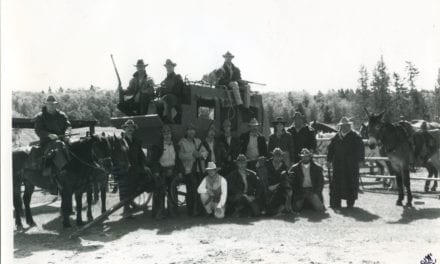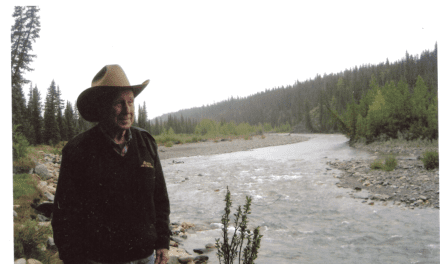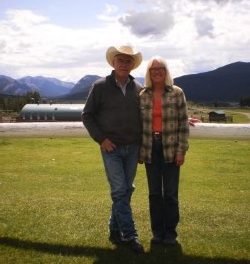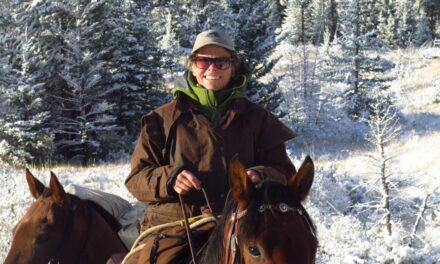(0:32:12) The only thing about the front country, like I say I loved it, but every once in a while you just had to get away and get out in the backcountry! The wardens usually stayed two years before they were transferred out to some other duties, they couldn’t wait toigo to the backcounty! They used to call it… what was it? “Four months of hell!” That was what they would refer to it as. But again, here we go with wardens that would just do the job as required.
(0:32:38) When I first took over the front country supervisor position like any greenhorn I just over supervised people and was soon to realize that these people don’t want to be supervised that close. They don’t want you looking over them and they don’t need it. I started to learn then as a manager that you just need to create a place for these people to work. Keep the politics off their backs and give them enough money to be able to do their job and they will do it. We had a few bad apples that just didn’t fit into the organization, but not many.
(0:33: 16) Then in 1989 I got the job as the Chief Warden in Kootenay. So again we had to uproot the family. We had a house in Canmore then. And again, Elaine never complained once. Yes, it is pretty amazing! The kids didn’t go with us that time. By this time they were out of school…So we took off and went to Kootenay. It was a great experience for the next nine years. It was operated so much different than Banff because Kootenay was, for want of a better word, a highway park, which means Highway 93 going through there kept you very busy. There were car accidents galore. Some bad ones too. I remember your dad telling me, “When you go to Kootenay, you’ll look at those avalanches paths and they don’t look that threatening, but don’t get complacent. They still are a threat.” Several times we did bury the road and talk about politics because that whole Columbia Valley depends on Highway 93 as their source of supplies! When that went down there were a lot of political problems. We didn’t have a great deal of public safety, but we had enough. Hans Fuhrer was in charge of it at that time. We didn’t have anything major like we did in Banff but you still had to be prepared.
(0:34:52) That was a great experience, being the Chief Warden and then Acting Superintendent in Kootenay. We were there nine years … Now in 1990, this is when things really started to change and not for the better. There was a lot of pressure being put on the warden service to make changes, although it was never clear what changes the senior managers wanted. We had a great contingent of chief park wardens in those days that got along really well. There was Bob Haney from Banff, Paul Galbraith from Jasper, Bill Dolan from Waterton, Paul Kutzer from Yoho and myself from Kootenay … We were really working hard as a group to ensure there was consistency throughout the Parks. It was a very effective model.
(0:39:37) Over time Parks went through several stages of change under different departments, then now, we became the Parks Canada Agency. To me, it was a major mistake. They made all kinds of promises promoting the agency – there would be more independence, more interaction in major decisions, more staff participation, we would have more money to work with… none of those promises ever came true. In fact, what they started to do was alienate the staff and visitors…I forget what the formula was now, but after a certain percentage you got to keep the money to run your park. But a big percentage went back to the agency. So there really was no initiative because you couldn’t carry a lot of this money over, it just went somewhere else. But you were taking it out of the tourist’s pockets and that was when the fees and everything else went up. We started to lose a lot of public support. The people of Canada loved national parks, but now it was starting to cost them a lot to visit. What happened in Parks was once we went to agency it was top down decision making from there on out. The emphasis was on making money. The shift to commercialize our parks was becoming more important than maintaining ecological stability.
(0:41 :26) What I really want to say through my interview here is about the changes that the warden service actually had to go through. In the late sixties the big change was toward centralization, in the 1970s big changes were happening with public safety, and then the big change in resource management which happening in the 1980s. By this time we had a really good science program. How far it had come from the late sixties was incredible. We had wardens that were managing major science programs. The job had changed immensely in a very short time and I was always proud of how well the wardens adapted to those challenges. Now for some reason or another, this became quite a threat to senior managers. They felt that the warden service was too independent. The Regional Director called for a review of the warden service. In the mid nineties the infamous Warden Report was presented to management. The report called the warden service a cult that was totally resistant to change! How could you say that after looking back from 1970 to where we were today was ridiculous? It wasn’t even the same. I mean the warden service culture was the same, solid as could be and that was why these programs were moving ahead. Now that became a threat. In 1995, senior managers were talking about splitting the warden service, although the rationale was never clearly articulated, at least not to the chief wardens.
(0:44:15) The sidearm battle to me was never a huge issue. It could have been resolved with some common sense. It was an excuse as far as I am concerned. I believe in my own mind that senior management saw this as an opportunity to drive the wedge in between the warden service. It was viewed as an instrument to finally make the split. There were models out there, like the American Rangers who still wear the same uniform, the only difference being the gun on the enforcement ranger’s hip. I
(0:46:47) To me the backcountry has just been totally neglected and I don’t think that this is going to turn around for a while. I think the drive for commercialism in national parks is gaining huge momentum. Again I blame senior management, a lot of them. But when I talk about senior management, I am thinking about the Ottawa level. The superintendents here must be really under a lot of pressure, but I always\ felt that had they stood united it could have been a different story….
(0:47:39) In 1998 I came back to Banff as Chief Park Warden. To me that was a highlight of my career because it closed a circle. I remember coming back to Banff and although I saw that the culture was starting to change I still felt at home. It was also an opportunity to work with Superintendent Charlie Zinkan, in my mind one of the best superintendent in Parks. After a couple of years in Banff I could see the changes coming; I had seen enough and it was time for me to go.



